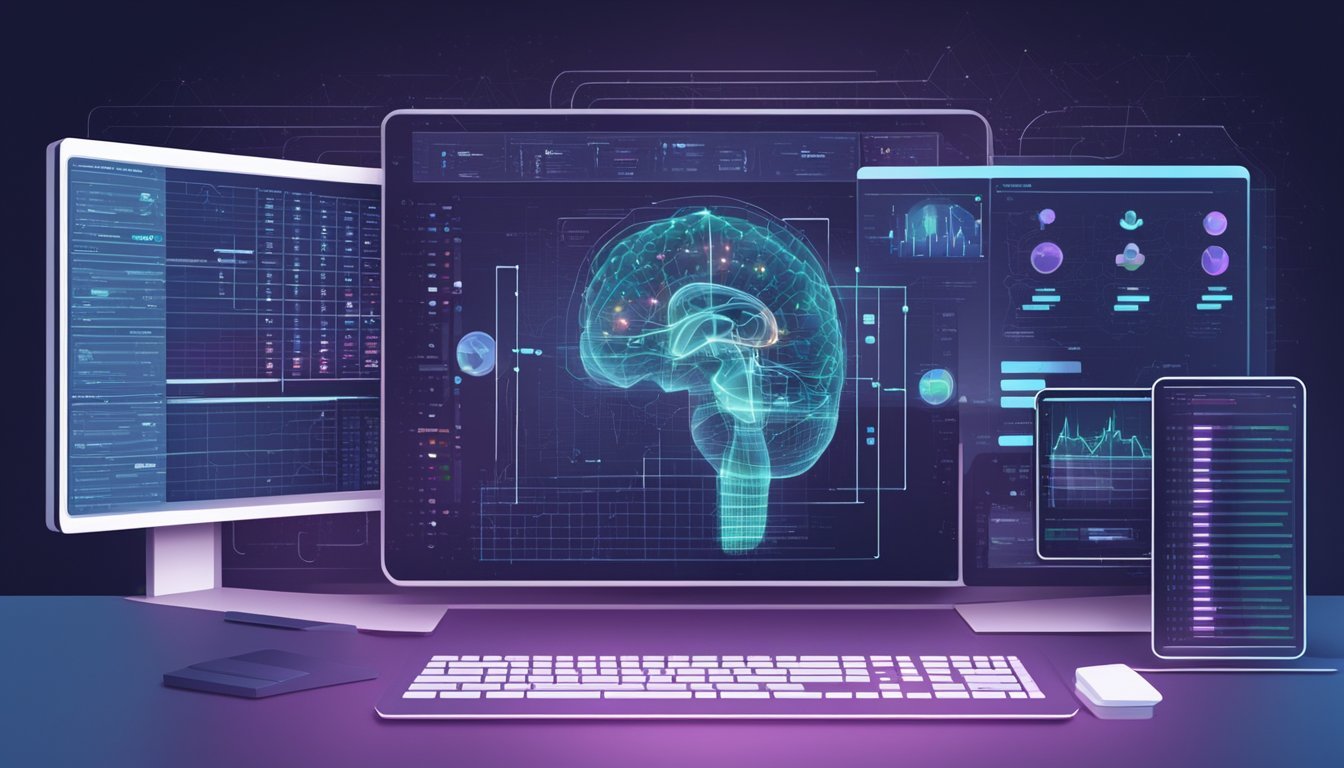Revolutionizing Healthcare: The Transformative Power of AI
Artificial intelligence is making strides in transforming the landscape of healthcare, offering innovative solutions to longstanding challenges. AI's ability to analyze complex datasets rapidly has led to improved diagnostic accuracy, more personalized treatment plans, and enhanced disease prediction models. These advancements are not only streamlining operational efficiencies but also elevating patient care to new heights. Through machine learning algorithms and advanced data analytics, AI is enabling healthcare providers to unravel complicated medical mysteries faster than ever before.
In the realm of public health, AI's impact is equally significant. It's being employed to monitor disease outbreaks, optimize resource allocation, and improve the overall quality of healthcare delivery. With AI's integration, medical professionals are better equipped to make informed decisions, and patients receive care that is more tailored to their individual needs. This deep integration of AI in healthcare has the potential to democratize access to quality care and bridge gaps in healthcare systems worldwide.
The expansion of AI in medicine also raises important ethical and practical considerations. These range from data privacy concerns to the need for robust training in AI tools for the healthcare workforce. As the technology becomes increasingly prevalent, it's imperative to ensure that AI is implemented safely and equitably. This involves a collaborative effort among technologists, healthcare providers, policy-makers, and patients to shape a future where AI serves as a benevolent force in advanced healthcare.
The Rise of AI in Healthcare
Artificial Intelligence (AI) is reshaping the landscape of healthcare delivery. As a fusion of innovation and technology, AI has become an integral part of digital health initiatives, playing a key role in diagnosing diseases, predicting patient outcomes, and personalizing patient care plans. The healthcare industry is increasingly leveraging AI algorithms to process vast amounts of data for insights that aid in clinical decision-making.
In recent years, the accelerated growth of AI applications within healthcare is apparent. Advanced algorithms analyze medical images with precision, often surpassing human performance. Machine learning, a subset of AI, empowers predictive analytics for patient risk stratification, while natural language processing facilitates unlocking unstructured data in health records. These technologies are not just auxiliary tools but are fundamental in driving the next wave of healthcare innovation.
Digital health solutions equipped with AI are enhancing patient engagement and compliance. They offer personalized healthcare experiences and encourage patients to take an active role in their health management. Furthermore, AI-powered robotics are evolving surgical procedures, making interventions less invasive and more accurate.
Importantly, the penetration of AI technologies in healthcare has given rise to important discussions on regulation, ethics, and data security. These dialogues are essential in drafting robust frameworks that hold AI applications in healthcare to the highest standards of safety and efficacy.
Technology Applications in Healthcare Predictive Analytics Risk Stratification Machine Learning Diagnostic Imaging Natural Language Processing Health Record Analysis Robotics Surgical Assistance
While AI in healthcare promises significant enhancements to patient outcomes, constant evaluation of these technologies ensures they serve the best interest of patients, healthcare providers, and the healthcare system at large.
Crucial AI Technologies in Medicine
Artificial Intelligence (AI) plays a pivotal role in the evolution of modern medicine, offering enhanced precision in diagnosis and treatment options. Here, three core AI technologies are explored, each significantly advancing the medical field.
Machine Learning and Deep Learning Applications
Machine learning and deep learning algorithms are transforming medical diagnosis and prognosis. A prominent application is in radiology, where convolutional neural networks (CNNs) excel in image recognition tasks. For instance, they are used in digital pathology to identify cancerous cells with high accuracy. Additionally, reinforcement learning has shown promise in treatment planning, where systems learn to recommend personalized treatments based on clinical data.
Natural Language Processing in Clinical Documentation
Natural Language Processing (NLP) has become indispensable in managing clinical documentation. NLP systems can parse and interpret vast amounts of unstructured text, extracting meaningful information that can augment patient databases and electronic health records. This eases the workload on healthcare professionals, who spend less time recording patient information and more time focusing on care.
Advancements in Medical Imaging
The impact of AI on medical imaging is particularly striking in the precision and speed of image analysis. AI algorithms, especially those based on deep learning, have improved the accuracy of detecting anomalies on scans, facilitating early diagnosis. By automating the detection of nuances that even skilled radiologists might miss, AI strengthens the reliability of assessments in branches such as oncology, cardiovascular, and neurology.
AI technologies in medicine are driving the field toward a future of improved patient outcomes, efficient clinical practices, and personalized patient care.
AI's Role in Diagnostics and Treatment
Artificial Intelligence (AI) is significantly enhancing the capacities of healthcare providers by offering more accurate diagnostics and tailored treatment plans. Particularly, AI-driven systems are excelling in areas like ophthalmology and skin cancer by advancing diagnostic precision and predicting disease prognosis.
Improving Diagnostic Accuracy
AI has revolutionized the way medical diagnoses are made, particularly through the analysis of medical imaging. For instance, in ophthalmology, AI algorithms have been trained to detect retinal diseases from ophthalmic images with a level of accuracy comparable to that of human experts. Additionally, in dermatology, AI-powered tools analyze images of skin lesions, aiding in the early detection of skin cancer. These systems can identify patterns and biomarkers in medical images that may be subtle or complex for the human eye, leading to better patient outcomes.
Personalized Medicine and Treatment Plans
Personalized medicine is an approach that tailors treatment to the individual characteristics of each patient. AI contributes to this field by integrating predictive analytics and biomarkers to design treatment plans. For example, AI systems can analyze genetic information, alongside clinical data, to predict the most effective drugs for a patient's specific condition, thus improving the prognosis.
Predictive Analytics in Patient Care
With predictive analytics, AI tools process vast datasets to forecast potential health events or disease prognosis. This not only assists in predicting disease but also in preventive care by identifying patients at high risk of developing conditions such as heart disease. AI analyses trends in data, such as echocardiograms, and can predict issues before they occur, allowing for timely intervention and improved patient care.
AI for Healthcare Management
Artificial intelligence (AI) is revolutionizing healthcare management by enhancing efficiency, optimizing healthcare delivery, and managing costs. Integral to this innovation, AI empowers health systems to tackle pressing challenges like chronic diseases and amplifies the efficacy of public health monitoring.
Optimizing Healthcare Delivery
AI applications are instrumental in streamlining healthcare delivery, employing algorithms to manage patient data and treatment plans. This results in reduced wait times and more personalized care. For instance, AI-driven tools aid in early disease detection, ensuring timely interventions and better outcomes.
Public Health and Population Monitoring
During events such as a pandemic, AI serves public health by monitoring and analyzing vast datasets, enabling officials to predict and respond to health crises more quickly. It has proven crucial in managing COVID-19 through the tracking of spread patterns and the evaluation of public health interventions.
Cost Management and Reduction
AI also offers solutions for the growing cost of care. By automating administrative tasks and predicting resource allocation needs, it reduces overhead and improves resource utilization. Consequently, healthcare systems can alleviate financial strain while maintaining, or even improving, the quality of patient care.
Impact on Providers and Patients
Artificial intelligence (AI) is reshaping the landscapes of clinical practice and patient care, offering transformative solutions to providers and patients alike, while also presenting new challenges in data security and privacy.
Clinical Practice Transformation
AI is streamlining clinical operations, allowing for more efficient patient care by providers. These systems can automate processes like scheduling and insurance claims, thus freeing up time for healthcare professionals to focus on direct patient care. Moreover, the use of AI in clinical practice is fostering the growth of a multidisciplinary team approach, integrating diverse skill sets for comprehensive care.
Patient Experience and Outcomes
For patients, AI advancements in healthcare are correlating with improved outcomes and personalized care. AI applications analyze real-world data and patient information to predict health events and suggest interventions. The use of AI in healthcare enhances patient engagement by providing them with detailed insights into their health, leading to better educated decisions about their care.
Challenges in Data Security and Privacy
While AI provides significant benefits, it also raises concerns for data security and the safeguarding of patient privacy. Providers and healthcare systems must ensure robust data security measures are in place as AI systems often handle sensitive health information and large volumes of real-world data. Maintaining patient trust is paramount as the healthcare workforce navigates these new technological frontiers.
Regulatory and Ethical Considerations
The deployment of artificial intelligence (AI) in healthcare necessitates careful consideration of regulatory frameworks and ethical guidelines to ensure patient safety and maintain trust in advanced technological systems.
Government and Institutional Regulations
Regulatory oversight is critical to ensure AI applications in healthcare are safe and effective. Governments and institutions work to put in place legislation and standards to guide the development and implementation of AI technologies. For instance, the U.S. Food and Drug Administration (FDA) evaluates AI-based medical devices to ensure they meet safety and efficacy requirements before they can be used in clinical settings. Europe's General Data Protection Regulation (GDPR) imposes strict rules on the handling of patient data, elevating the importance of data privacy in AI.
Ethical Use of AI and Patient Data
The ethical use of AI in healthcare hinges on the principles of transparency, fairness, and respect for patient autonomy. Important considerations include obtaining informed consent for the use of patient data and ensuring that AI decision-making processes are free from biases. Healthcare providers are obliged to protect patient data, as breaching confidentiality can lead to loss of trust and potential harm. Mechanisms are essential to address these ethical challenges and protect the interests of patients in a rapidly evolving digital landscape.
Future Trends in AI and Healthcare
The intersection of artificial intelligence and healthcare continues to yield groundbreaking innovations, with AI poised to revolutionize drug discovery, genomics, and epidemic management while enhancing telehealth services and the capabilities of chatbots.
Innovations in Drug Discovery and Genomics
AI is dramatically accelerating the pace of drug discovery by predicting how different drugs will interact with targets in the body. Complex algorithms analyze vast amounts of genomic data, identifying potential therapeutic targets at an unprecedented speed. This coupling of AI with genomics is fostering personalized medicine approaches, where treatments are tailored to an individual's genetic makeup, potentially improving outcomes and minimizing side effects.
Integration of AI with Telehealth and Chatbots
Telehealth has surged, with AI-driven chatbots becoming an integral part of virtual care. They offer instant, 24/7 support to patients, handling inquiries and triaging symptoms with increasing accuracy. The integration of AI extends the reach of healthcare professionals and provides a layer of convenience and efficiency that was previously unattainable. AI's predictive capabilities also enable these platforms to assist in monitoring patient compliance and managing chronic conditions more proactively.
The Role of AI in Managing Epidemics
During a pandemic, the role of AI becomes crucial in analyzing public health data to predict outbreak patterns and spread. These insights aid authorities in making informed decisions about resource allocation and containment strategies. AI-powered tools can also sift through massive datasets to understand the effectiveness of interventions and vaccines, enabling better preparedness and response for current and future epidemics.
Challenges and Opportunities
In the realm of advanced healthcare, artificial intelligence (AI) ushers in a wave of both promising opportunities and significant challenges. These aspects provide crucial touchstones for healthcare professionals, developers, and policymakers attempting to harness AI's potential while mitigating its risks.
Navigating the Misinformation Landscape
The proliferation of AI in healthcare has exacerbated the issue of misinformation, creating a landscape that can confuse and mislead both patients and professionals. Fact-checking and data verification systems are therefore imperative to filter through the noise and establish trusted channels of information. For example, AI tools must be meticulously tested to distinguish between reliable data and potentially harmful inaccuracies.
The Importance of Interdisciplinary Collaboration
Interdisciplinary collaboration is paramount in the development and implementation of AI in healthcare. A multidisciplinary team including clinicians, data scientists, ethicists, and policy experts ensures a holistic approach to AI solutions, promoting innovations that are not only technically sound but also ethically and socially responsible. This collective expertise is necessary to address complex health issues and foster sustainable healthcare systems.
Economic and Workforce Considerations
The integration of AI in healthcare presents economic challenges such as determining the value of AI applications and addressing the potential displacement of jobs. Yet, it also opens avenues for new roles within the healthcare workforce. For instance, AI-specialized nursing positions and informatics roles are burgeoning within the industry, reflecting the need for a workforce that is nimble and adaptive to technological advancements.
These dimensions reveal that the true potential of AI in advanced healthcare will be realized through careful examination of its societal impact and a concerted effort to align its capabilities with human needs.
Case Studies and Real-World Applications
In the healthcare sector, artificial intelligence has transitioned from theoretical explorations to practical implementations with a clear impact on patient outcomes and healthcare delivery.
AI Success Stories in Healthcare
Artificial intelligence has notably improved diagnostic accuracy and patient care efficiencies. The use of AI in healthcare has been exemplified by systems that can analyze radiology images with precision matching that of experienced radiologists. One such case is the detection of diabetic retinopathy through retinal scans, where AI algorithms have successfully identified the condition with a high level of accuracy, leading to early and more effective interventions.
Emerging Markets and AI Adoption
Emerging markets, particularly in Asia, have rapidly integrated AI into their healthcare systems. In China, AI technologies are being adopted in startups and hospital settings alike to address healthcare needs at scale, focusing on areas ranging from electronic medical records to predictive analytics for chronic disease management. This adoption is driven by a large population and a technology-friendly government that sees AI as a means to leapfrog traditional healthcare hurdles and improve outcomes for its citizens.
The Role of Payers and Academia in AI Development
In the ecosystem of AI in healthcare, payers and academia play crucial roles. Insurers are leveraging AI to optimize their services and reduce fraudulent claims, while academic research is advancing AI capabilities through rigorous studies and partnerships with the industry. Such collaboration is evident in developed algorithms that assist in crafting personalized treatment plans, demonstrating a significant shift in how clinical decisions are supported by machine intelligence.
By examining these focused areas, one can appreciate the practical application and beneficial reach of AI, undeniably reshaping the future of healthcare.





